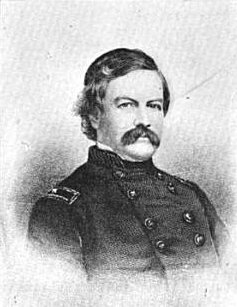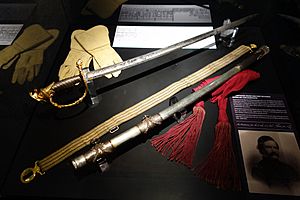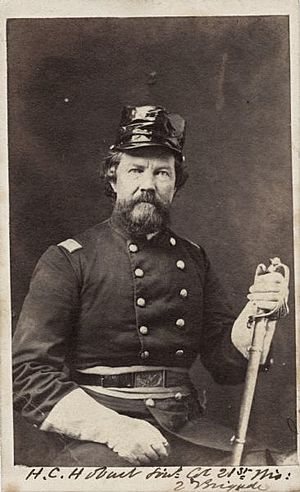Harrison Carroll Hobart facts for kids
Quick facts for kids
Harrison Carroll Hobart
|
|
|---|---|
 |
|
| 2nd Speaker of the Wisconsin Assembly | |
| In office January 10, 1849 – January 9, 1850 |
|
| Preceded by | Ninian E. Whiteside |
| Succeeded by | Moses M. Strong |
| Member of the Wisconsin Senate from the 1st district |
|
| In office June 5, 1848 – January 10, 1849 |
|
| Preceded by | Position Established |
| Succeeded by | Lemuel Goodell |
| Member of the Wisconsin State Assembly |
|
| In office January 9, 1867 – January 8, 1868 |
|
| Preceded by | William Pitt Lynde |
| Succeeded by | George Abert |
| Constituency | Milwaukee 2nd |
| In office January 12, 1859 – January 11, 1860 |
|
| Preceded by | James Robinson |
| Succeeded by | Asaph Green |
| Constituency | Calumet |
| In office January 10, 1849 – January 9, 1850 |
|
| Preceded by | Charles E. Morris |
| Succeeded by | Horatio N. Smith |
| Constituency | Sheboygan 1st |
| Representative to the Legislative Assembly of the Wisconsin Territory from Sheboygan and Washington Counties | |
| In office January 4, 1847 – October 18, 1847 |
|
| Preceded by | Position Established |
| Succeeded by | Benjamin H. Mooers |
| Personal details | |
| Born | January 31, 1815 Ashburnham, Massachusetts |
| Died | January 26, 1902 (aged 86) Milwaukee, Wisconsin |
| Resting place | Forest Home Cemetery, Milwaukee, Wisconsin |
| Political party | Democratic |
| Spouses |
|
| Alma mater | Dartmouth College |
| Profession | lawyer, politician |
| Military service | |
| Allegiance | |
| Branch/service | Union Army |
| Years of service | 1861–1865 |
| Rank | |
| Unit | 4th Reg. Wis. Vol. Infantry Army of the Gulf Army of the Cumberland Army of Georgia |
| Commands | 21st Reg. Wis. Vol. Infantry 1st Brigade, 1st Div., XIV Corps |
| Battles/wars | American Civil War |
Harrison Carroll Hobart (born January 31, 1815 – died January 26, 1902) was an American lawyer and politician. He was also an officer in the Union Army during the American Civil War. He served as the Speaker of the Wisconsin State Assembly and was a member of the Wisconsin State Senate. He ran for Governor of Wisconsin twice, in 1859 and 1865, as a member of the Democratic Party.
Contents
Growing Up and Education
Harrison Carroll Hobart was born on January 31, 1815, in Ashburnham, Massachusetts. He grew up on his father's farm and didn't get much formal schooling when he was young. At age 16, he moved to New Hampshire. There, he worked for three years as an apprentice in a print shop. An apprentice learns a trade by working for an expert. He saved enough money to attend Concord Literary Institute and New Hampton Academy.
In 1838, he started college at Dartmouth College and finished in 1842. He paid for his studies by teaching at Rochester Academy. While at Dartmouth, he helped start a fraternity called Kappa Kappa Kappa. A fraternity is a social club for college students. Hobart wanted this group to be fair and open to everyone, not just those with special advantages. After college, he studied law in Boston and became a lawyer in 1845.
Starting a Political Career in Wisconsin
The next year, Harrison Hobart moved to the Wisconsin Territory. He settled near Sheboygan, by Lake Michigan. He quickly became a well-known lawyer and got involved in local politics with the Democratic Party.
In 1847, Hobart served in the Wisconsin Territorial House of Representatives. This was the lower house of the territory's government. When Wisconsin became a state, he was elected to the Wisconsin State Senate in 1848. Later that year, he was elected to the Wisconsin State Assembly for 1849. The Assembly members chose him to be their Speaker, which is like the leader of the group.
In 1850, the Democratic Party chose him to run for Congress. He ran against James Duane Doty, who was already in office. Doty ran as an independent and won easily.
In 1854, Hobart moved west to Calumet County. He helped found the city of Chilton, Wisconsin. In 1856, he ran for Congress again but lost to Charles Billinghurst. He was elected to the Wisconsin State Assembly in 1859, representing Calumet County. During this time, he helped create a law to build a railroad from Milwaukee to Green Bay. This railroad later became part of a much larger system. He also joined the University of Wisconsin Board of Regents, which helps manage the university. In 1859, he ran for Governor of Wisconsin but was defeated by Alexander Randall.
Serving in the Civil War
Just two weeks after the American Civil War began, Harrison Hobart joined the army. He helped gather a group of volunteers from the Chilton area for the Union Army. These volunteers chose him as their Captain and called themselves the "Calumet Rifles."
Fighting in Louisiana
Hobart's volunteers became Company K of the 4th Wisconsin Volunteer Infantry Regiment. They officially joined the army on July 2, 1861. The regiment was sent to Louisiana to help the Union take control of the Mississippi River. Hobart and the 4th Infantry helped capture New Orleans and Baton Rouge.
Battles in Tennessee
In 1862, Hobart left the 4th Infantry. He was promoted to Lieutenant Colonel and joined the new 21st Wisconsin Volunteer Infantry Regiment. The 21st Regiment had already been fighting in Kentucky. Hobart met them in Lebanon, Kentucky, after a tough battle where their commander was wounded.
Hobart took command of the 21st Regiment. He led them in battles like Stones River and Hoover's Gap in Tennessee. General Lovell Rousseau praised Hobart and the 21st Regiment for their bravery at Stones River. After these victories, the 21st Regiment moved into Georgia.
At the Battle of Chickamauga on September 20, 1863, Union forces were told to retreat. But the 21st Regiment didn't get the order. They kept fighting until they were almost surrounded by Confederate soldiers. While trying to escape, Lieutenant Colonel Hobart was wounded and captured. About 70 of his soldiers were also taken prisoner.
A Daring Escape from Prison
Hobart was sent to Libby Prison in Richmond, Virginia. This was a famous Confederate prison. On February 9, 1864, he helped lead a daring escape. One hundred nine Union prisoners escaped through a secret tunnel they had dug. Hobart was the last one to go through the tunnel, and he closed it behind him. About half of the men, including Hobart, made it back to Union lines.
Campaigns in Georgia and the Carolinas
Hobart rejoined the 21st Regiment in April 1864. They were stationed at Lookout Mountain, Tennessee. On May 2, they marched to join General William Tecumseh Sherman's army in the Atlanta Campaign. The 21st Regiment fought in several battles, including Rocky Face Ridge, Resaca, and Dallas. They showed great courage under heavy fire.
After the Battle of Kennesaw Mountain, Lieutenant Colonel Hobart was given command of three other regiments. He was later promoted to Colonel and put in charge of a larger group of soldiers.
Hobart's brigade then joined Sherman's famous March to the Sea. They marched through Georgia, foraging for supplies and helping to burn parts of Marietta, Georgia. When they reached Savannah, General Sherman recommended Hobart for a special promotion to Brigadier General. President Abraham Lincoln approved this promotion in February 1865.
In January 1865, Sherman began his Campaign of the Carolinas. Hobart led his brigade north through South Carolina and into North Carolina. They fought in the Battle of Averasborough and the Battle of Bentonville. Hobart was noted for leading his soldiers bravely at Bentonville. This was their last major battle. Hobart's brigade reached Goldsboro, North Carolina, in March and was the first unit to enter Raleigh, in April. Hobart was officially discharged from the army on June 16, 1865, after the war ended.
Life After the War
After the war, Harrison Hobart ran for Governor of Wisconsin again, but he was not successful. He served in the State Assembly one last time in 1867. Later, he worked on the Milwaukee Common Council, which is like a city council. He even served as acting mayor of Milwaukee for a time.
Hobart also helped write a book called The Citizen Soldier in 1879. It was the autobiography of General John Beatty. Hobart wrote a special chapter in the book about his time in Libby Prison and his famous escape. He passed away on January 26, 1902, in Milwaukee, Wisconsin. He is buried in Forest Home Cemetery.
Family and Lasting Impact
Harrison Hobart married Frances Imogen Lowery on February 2, 1854. Sadly, she died just over a year later. He married his second wife, Anna Clarence Mower, on June 8, 1857. She was a widow with two children from her first marriage. Hobart did not have any children of his own.
In 1888, Hobart gave some of his land in Chilton to be used as a city park. This park is named "Hobart Park" in his honor. Today, it is part of the Calumet County Fair Grounds.
 | William M. Jackson |
 | Juan E. Gilbert |
 | Neil deGrasse Tyson |



